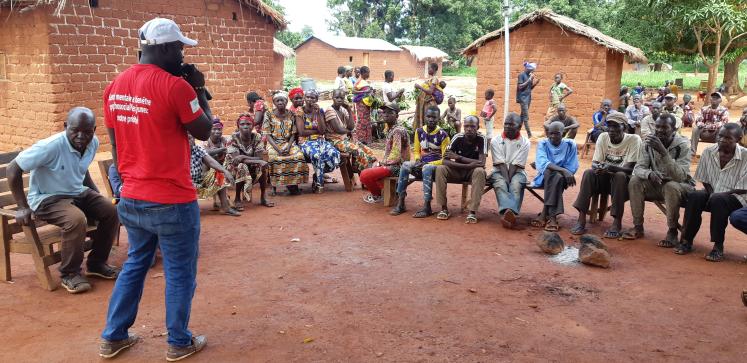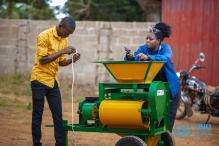One of the key pillars of the Youth, Peace and Security (YPS) agenda established by Security Council Resolution 2250 (2015) was to advance the “meaningful participation of youth in peace processes and dispute-resolution”. Yet 10 years on from such commitments, the level of youth participation in national peace processes is still very low. One 2023 study found that only 12 per cent of peace agreements between 1990 and 2022 even referenced young people or youth issues; the number that actually involve young people in these processes is significantly lower.
UNU-CPR recently conducted research for the 2025 Peacebuilding Fund Thematic Review on Youth, Peace and Security to try to identify ways of enhancing youth participation and taking forward the YPS agenda. The Review examined a select number of youth- and YPS-focused projects in 33 countries and territories that were supported by the Peacebuilding Fund (PBF) since 2018. Among them, one of the projects implemented in the Central African Republic (CAR) from 2019 to 2022 offered insights into some of the challenges of increasing young people’s participation in peace process.
In 2019, CAR took a major step toward ending its long-running conflict with the signing of the Political Agreement for Peace and Reconciliation (APPR-RCA) between the Government and 14 armed groups. But for a country where 72 per cent of the population is under the age of 35, and where youth played a critical role in both the conflict and the push for peace, the absence of young people at the negotiating table was striking.
Despite being excluded from the Khartoum talks, a follow-on national reconciliation campaign included in the agreement opened a window for youth participation. With support from the PBF, a project (PBF/IRF-334) was launched by the international NGO Accord, in coordination with the National Youth Council and a local youth-focused organization, known as Uru, to take advantage of this opportunity. It was designed to leverage this momentum to include young Central Africans in discussions on the agreement's implementation, and also to advance broader commitments by the CAR Government to greater youth inclusion as part of addressing one of the structural drivers of conflict.
But inclusion wasn’t just a matter of access. As one staff member candidly explained, “The youth were not adequately prepared for engagement at such a high level.” With a national literacy rate of just over 13 per cent, very few young people had the skills or knowledge needed to participate meaningfully in policy discussions or peace implementation. Beyond literacy alone, young people would have to be equipped to understand conflict dynamics, the agreement itself, and any subsequent policy options and decisions, as well as to effectively advocate for their positions. Without preparation, they risked being tokenized, or worse, manipulated.
As a result, implementing partners shifted the focus of the project from the original vision of directly involving youth in dialogues, to instead taking the first, necessary steps of preparing youth to be active participants, both in this follow-on process and in other future peace processes or political dialogues. Training was provided to 750 young men and women on key themes like civic education, conflict prevention, management and resolution, community leadership and the rule of law. One hundred and fifty youth were further trained as trainers, ensuring the transfer of these skills to their communities. The project implementing partners also organized an informational session on the agreement itself in three of the most conflict-prone locations: Bangui (the capital), Bambari and Bossangoa, involving hundreds of youth participants.
This project experience highlights a critical gap in translating policy into practice in youth inclusion in peace processes. Programmatic responses have commonly focused on improving access for youth and ensuring they have a seat at the table – and this is certainly a key gap. However, the project illustrated that an additional prerequisite is equipping young people with the skills and experiences necessary to allow them to effectively contribute to discussions. Only then could youth have a chance to meaningfully participate, in ways that shape peace processes and their future implementation for the better.
This research snapshot is taken from the 2025 Peacebuilding Fund Thematic Review on Youth, Peace and Security (YPS). Explore the full 2025 YPS Thematic Review to learn how youth are reshaping peace in conflict-affected regions around the world.


